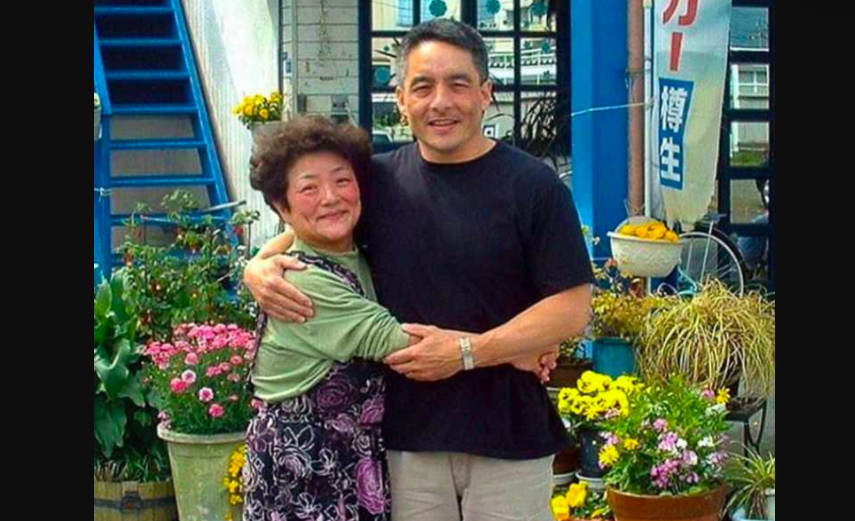Air Force Colonel Bruce Hollywood always suspected that he was adopted. Despite having an Irish father and a Norweigan mother, he began to realize that he had distinctly Asian features. Something didn’t add up.
But even after his adoptive parents confirmed his suspicions, Hollywood never sought out his birth mother. His parents had disclosed his birth mother’s family name, encouraged him to investigate his roots and even offered to pay for a flight to Japan, but he had always declined. Then, he had a heart attack.
Taylor Swift’s EPIC Surprise for 2,000 Foster and Adoptive Children
Lying in the parking lot of the Pentagon, gasping for breath, Hollywood instantly regretted not seeking out his biological mom. Something about that near-death experience shifted his perspective, and, following his recovery, he became a man on a mission.
At first, Hollywood exhausted every possible lead, with zero results. All he desired to do was to pen his mother a letter, reading, “I lived the best life ever. I’m a colonel in the United States Air Force. I’ve got beautiful children. Life is really good.” He wanted to give her something to know him by and desired for her to understand just how well his life had turned out in the United States.
But no matter how hard he tried, he could not locate her. He was in touch with both the Japanese Embassy and the U.S. Embassy in Tokyo, but neither could help him. Hollywood even hired a private detective to look into his case, but still came away empty-handed. Eventually, he lost hope that he would ever find his mother.
“I thought, ‘You know what, I’ve tried. I’ve made all the effort that I can make. It’s just unfortunate,’ ” Hollywood said in an interview with the Washington Post.
Then, just when he’d given up hope of ever finding his birth mom, a chance encounter with a fellow military man completely swung his fortunes.
The man sitting across from him at Dulles Airport was Adm. Harry Harris, whose mother was also Japanese. As it turned out, Harris also commands the U.S. forces in the Pacific and has been nominated to be ambassador to South Korea. Naturally, the two men started sharing stories, and things began to fall into place.
“I told him the story about having the heart attack and wishing I could find my mother. And he said, ‘Bruce, I can help you.’ And I said, ‘You know what, you’re an admiral and all, but you can’t. I’ve been to the embassy. I’ve tried this, and you just can’t help any,’” Hollywood recalled.
But the commander was convinced that he could do something for his fellow serviceman.
“You know, Bruce, seriously, I can help,” Harris said.
The two exchanged information and went on their way. Considering the extensive disappointment he had experienced in his emotive quest, Hollywood wasn’t expecting much. Then one day, as he sat at his desk in the Pentagon, the phone rang: It was the Japanese Embassy.
Hollywood remembers the call like it was yesterday: “‘Colonel Hollywoodm we’re really pleased to tell you that we found your mother, Nobue Ouchi.'”
“And I said, ‘Oh my gosh, this is wonderful. You’ve got to help me start writing this letter. And I want it to be accurate, and I want it to be culturally sensitive. And you’ve got to help me,'” he recalled saying.
“There’s not going to be a letter,” the caller responded. “She’s going to call you at this phone number in 10 minutes, and she doesn’t speak English. Good luck!”
Bruce frantically searched for a translator. He couldn’t believe it — he was finally going to speak to his biological mother.
When she got on the phone, it was clear that his mother, Nobue, could not speak enough English to hold any sort of coherent conversation. So, he had to rely on the translator. But all he could hear was sobbing and muffled speech. Hollywood demanded to know what was going on.
The translator replied: “‘Well, tomorrow is your mother’s 65th birthday, and the birthday present that she dreamed of her whole life is that you would come back to her.’”
Hollywood’s mother said she never married “because she said in her heart there was only room for one man. And it was you, and she knew you would be back.”
The next piece of information provided by the translator was even more incredible: Hollywood’s mother ran her own business. The name of her restaurant? “Bruce.” Hollywood was absolutely stunned, but he knew what he had to do next.
https://www.instagram.com/p/BiMduHnHsL3/?taken-by=kathryn.tolbert
Ten days later, Bruce was in Shizuoka, Japan, and reunited with his long-lost mother. She told him the whole story of his adoption. As it turns out, Hollywood’s biological father — an American service member — had intended to marry her, but was suddenly shipped back to North Carolina. After that heartbreak, Nobue refused to speak to him again. She explained how her father, a fisherman, offered to support her in raising Bruce on her own but noted that it would be too difficult for a mixed-race child to live in Japan at the time — so she gave her son up for adoption.
For Hollywood, it was an incredible time of bonding with his biological mom and confirmed in him a new sense of identity as a Japanese American.
“The last 12 years, I finally became a Japanese American,” he said. “Before that I had no Japanese American identity. I just had Japanese American features. … But as I got integrated in this community, I ended up becoming incredibly proud of this heritage that I had.”
“I’ve got to tell you if I didn’t live it, I almost wouldn’t believe it,” he added.
(H/T: The Washington Post)



